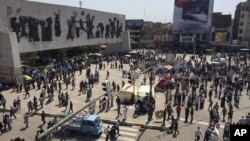I am back in Baghdad, and I am happy. I have always liked this city, even during the bad days.
The reporting is so intense that it makes you forget everything else, every niggling little problem. Even big problem just gets shoved aside. What matters is getting the story.
Today, there was supposed to be a huge demonstration by Shi'ite cleric Muqtada al-Sadr's supporters, and he has hundreds of thousands. Some say millions.
I got up early, checked my gear: camera, tripod, charged batteries, two microphones. Two cellphones, charged, iPhone rig, microphone, batteries. Then I looked out the window at pouring rain. Oh, good, I said to myself.
Security was tight in the city. But I didn't know how tight.
My driver called me. "Sharon, I can't make it, all the bridges are closed."
Baghdad is divided east to west by the Tigris River, with a number of large and small bridges connecting the two sides. The International Zone is on the west side. My hotel was on the east side.
"There is not a way through. They have sealed the bridges with concrete walls," the driver said.
Alternate plan
No worries. I ran to the team that is helping me here. I needed another driver, one on this side of the river. Tahrir Square sits on the west side of the bridge leading to the International Zone and the demonstration was supposed to start there.
"Maybe we can drive, then walk?" OK, good idea. They got me a new driver and put me in a white Land Cruiser, the car of choice in Baghdad. We took off.
There were police, army and other security forces all about, each with loyalty to a different ministry. There were many militias, too. But the streets also were full of people doing their Friday weekend shopping. We drove down streets where I spent a lot of time in 2004 and 2005.
Baghdad has changed. There are more shops, and more shoppers bustling on the street.
The square was the same though, except this time the bridge was closed. At the entrance, armed forces, some with their faces covered, stood behind razor wire. Blue police trucks blocked the side streets. The sun was blazing, and I suddenly remembered how punishingly hot Baghdad could get.
Encountering barriers
The last pedestrian checkpoint would not let me in with my camera. Cellphones only. I laughed and joked and asked to take pictures with them – the paramilitary force known as the federal police. They were persuaded. Through that checkpoint, we moved on to the general in charge, and asked if we could bring in the camera. Permission was granted. Back out all the checkpoints, past the federal police, back to the car, got the camera, walked back again to the first checkpoint.
The young police officer drew me aside. He asked me to please erase all the pictures I took. I had already Tweeted the one I wanted, so I complied and I deleted everything in front of him.
Then an older officer – with a face like a red bullfrog, sitting on a chair under a blue tarp – beckoned me over. "Press pass," he said. He took it. Grimaced.
I looked at him, smiled and pointed to my picture. "Helwa?" ("Beautiful?") I asked. He squinted, looked again, then looked at me.
"No, not really." He handed the card to another officer. "Fifty-fifty," the second one said.
I almost fell down laughing. That was the funniest part of my day. Iraqis can be brutally honest.
The demonstration turned out to be a bust. Maybe a hundred young men and one older man who appeared very high on life spent about an hour shouting, waving flags and running around. Then they all melted away. The feared demonstration just never happened.
Come back tomorrow, they said.
You bet.





